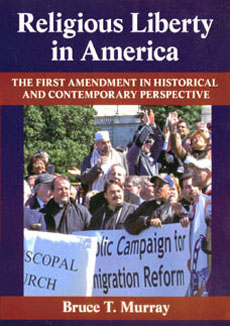‘Justice Scalia’ opines in the Hobby Lobby case
In no uncertain terms: How Justice Scalia would have expressed the majority opinion in Hobby Lobby
By Bruce T. Murray
Author, Religious Liberty in America: The First Amendment in Historical and Contemporary Perspective
 “The wicked flee.” — Justice Antonin Scalia
“The wicked flee.” — Justice Antonin Scalia• Are corporations conscientious “persons” – and thus entitled to the First Amendment’s guarantee of free exercise of religion? It’s a no-brainer.
• May a corporate “person” claim an exemption from a law of general applicability – in this case the Affordable Care Act – if the law conflicts with the “person’s” religious beliefs? It’s obvious.
• What did Congress mean when it passed the Religious Freedom Restoration Act? Congress didn’t have a clue.
Author Bruce T. Murray takes a stab at how Justice Antonin Scalia might have expressed his opinion in the recent case, Burwell v. Hobby Lobby Stores, Inc. Predictably, Scalia ruled with the 5-4 majority in favor of the company that sought a religious exemption to the contraceptive mandate contained in the Affordable Care Act. But Scalia did not write the opinion of the Court, nor did he submit a concurring opinion. No doubt, the Court's most outspoken and quotable justice would have plenty to say about the issue.
In this imagined concurring opinion, “Scalia” touches on many of his familiar themes: Originalism, textualism, attacks on colleagues, attacks on Congress, attacks on precedent, arrogance, humor, irony and impeccable logic.
At his best, Scalia very effectively analogizes and distinguishes cases when analyzing the Hobby Lobby case. Here, he rightly points out that the controlled substance laws that were in issue in Employment Division v. Smith and Gonzales v. Raich are very different types of laws than the Affordable Care Act. Criminal drug laws and the health care mandate are worlds apart in their purpose, scope, and application. In distinguishing the laws and their factual applications, Scalia effectively lays the groundwork for his reasoning in Hobby Lobby.
On the other hand, the ease with which he finds grounds for a judicial exemption in Hobby Lobby, compared to the absoluteness of his refusal in Smith, is suspicious, regardless of how well he distinguishes the cases.

See the rest of Scalia’s “opinion” here. Also see a critique of Scalia’s opinion, and a detailed analysis of Scalia’s judicial philosophy.
Bruce T. Murray is the author of Religious Liberty in America: The First Amendment in Historical and Contemporary Perspective, published by the University of Massachusetts Press. He is currently a third year law student at Thomas Jefferson School of Law in San Diego.

